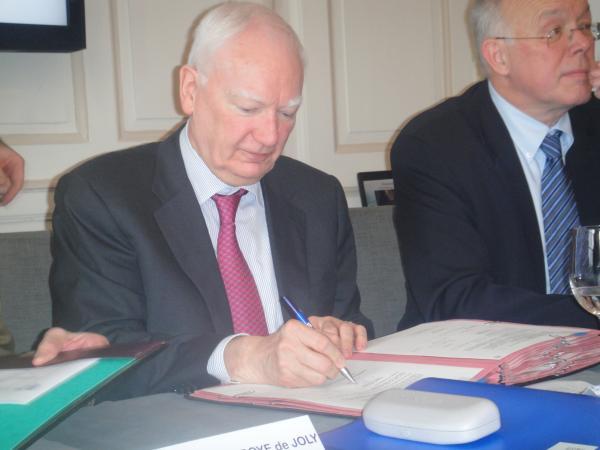
The European Investment Bank (EIB), the Brussels-Capital Region (BCR) and HYDROBRU (Brussels water distribution and sewerage intermunicipality) entered into agreements in Brussels on 3 December 2010 to finance the upgrading of the Brussels Region’s wastewater and stormwater treatment systems. The EIB loan of EUR 168m signed today will cover nearly half the investments planned up to 2014. This major EUR 1.5bn programme will, over the next 20 years, upgrade the entire sewerage system and provide the 19 municipalities of the Brussels-Capital Region with a modern, efficient network. This loan is consistent with the EIB’s strategy of improving environmental management and promoting sustainable development in keeping with the European Union’s environmental policy.
The Brussels Region’s sewerage network currently has some 2 000 km of sewers carrying wastewater and stormwater to the two treatment plants located to the south and north of Brussels. Developed since the end of the 19th century, it is now in such an advanced state of decay that it causes roads to collapse at considerable cost. The situation is a matter of great urgency and certain sections must be renovated as soon as possible. Furthermore, the dilapidated state of the network and the inadequacy of facilities for stormwater storage and disposal are frequently the cause of flooding in certain municipalities.
As soon as it entered into service in 2007, HYDROBRU’s Board of Directors realised the seriousness of the situation and entrusted its partner Vivaqua with presenting a report on the condition of the sewerage network for which HYDROBRU is responsible.
After entrusting the Brussels-Capital Region with comprehensively mapping and conducting a detailed review of the sewerage system, HYDROBRU reached the conclusion that around 500 km of the network was in poor condition and needed to be renovated with varying degrees of urgency. To keep mobility within the city at acceptable levels, these renovations will be staggered over the next 20 years at a rate of around 25 km a year. The techniques used will aim to achieve optimal efficiency while at the same time minimising the level of disturbance for the city’s residents.
The first phase of the programme launched this year, focusing on the upgrading and extension of networks and the completion of specific works to help resolve the recurring flooding problems in certain municipalities, will be spread out until 2014. The impact for the people of Brussels will be directly noticeable as the works proceed – roads no longer prone to collapse, more resistant networks (especially in the event of flooding) and some 200 jobs created.
In order to minimise this major project’s impact on consumers’ bills, HYDROBRU sought alternative financing methods and turned to the European Investment Bank. Following an in-depth appraisal, the EIB was convinced of the project’s calibre and decided to be a financial partner of the project alongside the Brussels-Capital Region, which will provide its financial guarantee. This partnership will enable HYDROBRU to receive a loan of EUR 168m on favourable financial terms, thereby substantially reducing the knock-on effect for Brussels households in their water bill.
The respective contracts and agreements were signed on 3 December 2010 in Brussels by the Minister-Chairman of the Government of the Brussels-Capital Region, Charles Picqué, Finance Minister Jean-Luc Vanraes and Water Policy Minister Evelyne Huytebroeck, Chairman of HYDROBRU Jacques Martroye de Joly, Vice-Chairman Abdellah Achaoui, and EIB President Philippe Maystadt, in the presence of a number of representatives of BCR’s 19 municipalities.
At the signing ceremony, EIB President Philippe Maystadt stressed the importance of this upgrading programme which will be financed by the EIB as part of its policy of promoting the environment. “This investment is essential for the Region and especially for the daily lives of the people of Brussels”, he declared. “The EIB is among the biggest lenders to the water sector in Europe and beyond and has financed a number of distribution and sewerage projects in Flanders and Wallonia (Aquafin, CILE, SPGE, SWDE). The loan to HYDROBRU is consistent with this strategy and will make vital investments possible while at the same time reducing their financial impact for the final consumer.”
Minister-Chairman Charles Picqué remarked: “The renovation of Brussels’ sewerage system has been a concern for the Region for a number of years now. The upgrading of sewers will have multiple positive effects for residents – hygiene, prevention of flooding, pollution management, etc. Furthermore, the current state of dilapidation of certain sections results in roads collapsing and the repairs are much costlier than a long-term investment programme. I am delighted with this fruitful cooperation between the EIB, HYDROBRU and the Region, which will help to minimise the impact on consumers’ bills.”


